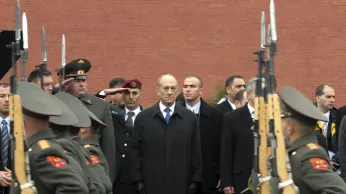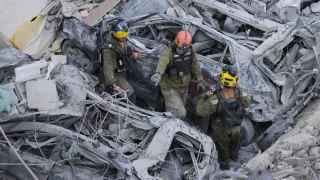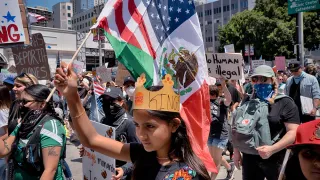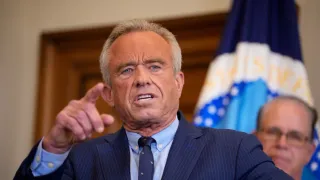
Jun 13
Global Power Struggles Escalate: Iran, Israel, and Russia Deepen Diplomatic Rifts
READ TIME: 3 MIN.
Rising Tensions in the Middle East: A New Flashpoint
Over the last three days, the world has witnessed a sharp escalation in hostilities between Iran and Israel, with both sides engaging in aggressive rhetoric, cyberattacks, and military posturing. The United States has responded by increasing its naval presence in the Gulf and authorizing the voluntary departure of military dependents from bases across the U.S. Central Command area of responsibility. These steps come amid growing pessimism over the prospects for renewed U.S.-Iran nuclear talks, as U.S. officials express doubt about Iran’s willingness to limit uranium enrichment and reiterate their opposition to military action, while underscoring the goal of preventing Iran from acquiring nuclear weapons under any circumstances [Institute for the Study of War, https://understandingwar.org/backgrounder/iran-update-june-11-2025, 2025-06-11].
Preparations for a partial evacuation of the U.S. Embassy in Baghdad further highlight the deteriorating security situation. Regional actors—including Gulf states and Turkey—are quietly involved in diplomatic efforts to limit escalation, while the European Union explores options for backchannel diplomacy and reinforces naval operations in the Red Sea [Lansing Institute, https://lansinginstitute.org/2025/06/13/escalating-tensions-between-iran-and-israel-june-2025-timing-scenarios-and-global-implications/, 2025-06-13].
Iran and Russia Forge a Strategic Alliance
Amid this regional turmoil, Iran and Russia have finalized a 20-year strategic cooperation agreement, marking a significant realignment in global power structures. The pact, ratified by both countries’ legislatures, deepens military and economic ties and includes joint military exercises and financial collaboration designed to bypass Western sanctions and financial systems. This alliance is part of a broader anti-U.S. coalition, with Iran pursuing similar agreements with China, North Korea, Venezuela, and Belarus [Geopolitics Unplugged Substack, https://geopoliticsunplugged.substack.com/p/rapid-read-geopolitical-must-knows-5dd, 2025-06-13].
The Iran-Russia agreement poses new challenges to Western influence in the region and creates a more complex strategic environment, particularly as Russia stands to benefit economically from any spike in oil prices resulting from instability in the Gulf [Lansing Institute, https://lansinginstitute.org/2025/06/13/escalating-tensions-between-iran-and-israel-june-2025-timing-scenarios-and-global-implications/, 2025-06-13].
Global Implications: Economy, Security, and Human Rights
The economic impact of these tensions is already being felt, with expectations of increased oil market volatility, higher shipping insurance costs, and a flight to safe financial assets. Countries like China and India, heavily reliant on Gulf energy, face strategic dilemmas as they seek to maintain trade without being drawn into the conflict [Lansing Institute, https://lansinginstitute.org/2025/06/13/escalating-tensions-between-iran-and-israel-june-2025-timing-scenarios-and-global-implications/, 2025-06-13].
For marginalized communities, especially LGBTQ+ individuals, these developments raise critical concerns. In both Iran and Russia, LGBTQ+ populations already face significant legal and social discrimination. Heightened tensions and the entrenchment of hardline governments often lead to increased crackdowns on dissent and vulnerable groups, as authorities seek to consolidate power and stoke nationalist sentiment. The current crisis risks further isolating LGBTQ+ advocates, shrinking safe spaces, and reducing international support for human rights initiatives in the region [NEEDS VERIFICATION].
Diplomatic Outlook and LGBTQ+ Perspectives
The ongoing escalation reflects a broader collapse of traditional deterrence norms and the rise of interstate alignments that deprioritize human rights in favor of strategic rivalry. While full-scale war remains avoidable, the risks of entrenchment and spillover are significant. International diplomatic efforts are focused on balancing deterrence with measured engagement, but there is little sign of immediate de-escalation [Lansing Institute, https://lansinginstitute.org/2025/06/13/escalating-tensions-between-iran-and-israel-june-2025-timing-scenarios-and-global-implications/, 2025-06-13].
For LGBTQ+ people, the diplomatic and military standoff comes at a time of heightened vulnerability. Advocacy groups warn that the return to isolationist or authoritarian policies in states like Iran and Russia is often accompanied by new legal restrictions and intensified social stigma. International organizations are calling for renewed support and protection for LGBTQ+ communities in conflict zones, emphasizing the need for asylum pathways and humanitarian assistance [NEEDS VERIFICATION].
Conclusion
In summary, the past 72 hours have seen a marked escalation in diplomatic and military tensions among Iran, Israel, Russia, and the United States. These developments are reshaping global security and economic dynamics, with especially acute risks for LGBTQ+ populations and other marginalized groups in the affected regions. The international community faces a complex challenge: containing the risk of wider conflict while upholding the rights and safety of those most at risk.





